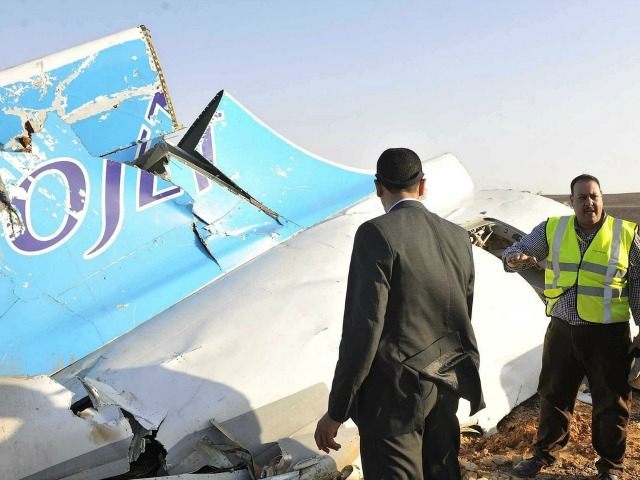According to U.S. officials, satellite imagery shows a heat flash immediately before a Russian plane crashed into Egypt’s Sinai Peninsula. This evidence could disprove the theory the plane was shot down by a missile.
“The speculation that this plane was brought down by a missile is off the table,” declared one official.
The official told NBC News that the imagery led experts to “believe it could have been some kind of explosion on the aircraft itself, either a fuel tank or a bomb.” More than likely “the plane disintegrated at a very high altitude.”
“The number of heat signatures is crucial,” explained CNN aviation analyst Miles O’Brien. “If, in fact, only one was detected, that in some respects might steer one away from a missile launch and onto some idea of an explosion on board the aircraft.”
Radical Islamic group the Islamic State (ISIS/ISIL) claimed responsibility for the tragedy. ISIS-linked organization Wilayat Sinai–formerly known as Ansar Bayt al-Maqdis–posted a statement on social media, declaring, “The fighters of the Islamic State were able to down a Russian plane over Sinai province that was carrying over 220 Russian crusaders. They were all killed, thanks be to God.”
Russian and Egyptian officials immediately dismissed its claim.
Russian propaganda outlets are reporting the injuries suffered by the passengers point to an explosion on the plane.
“A large number of body parts may indicate that a powerful explosion took place aboard the plane before it hit the ground,” an Egyptian forensic expert told Sputnik.
The Egyptian Civil Aviation Ministry explained to the media that they cannot “talk about the results as we go along” and warned it “could be a long process.” Egyptian cabinet spokesman Hossam al-Kawish said that “it could take between one and four weeks” to analyze the plane’s recorders.
The Metrojet Airbus A321-200 crashed on Saturday, killing all 224 people. Metrojet Deputy Director Alexander Smirnov told the media “an external impact on the airplane” is the only way the airplane could have come down. But Alexander Neradko, Russia’a top aviation official, said Smirnov’s comments were “premature and unfounded.”
On Monday, the government’s tone slightly changed when Russian President Vladimir Putin’s spokesman Dmitry Peskov said they cannot rule out anything.
“Of course, at a time when an investigation is still unfolding, putting forward anything on an official level does not present itself as possible,” he told the media.
CBS News reported that “Viktor Yung, another deputy director general of Metrojet, said the crew did not send a distress call and did not contact traffic controllers before the crash.” Egyptian officials tell a different story with recordings from the cockpit. The Guardian reports:
Pilots spoke to air traffic controllers four minutes before the aircraft disappeared from the radar in a routine exchange and no unusual conversation followed. But an unnamed source quoted by Interfax said “sounds uncharacteristic of routine flight were recorded preceding the moment that the aircraft disappeared from radar screens.”
The recording indicated a situation had developed “suddenly and unexpectedly,” the source added. It was not possible to verify the report, and Interfax gave no further information. Investigators are yet to officially release data or findings.

COMMENTS
Please let us know if you're having issues with commenting.